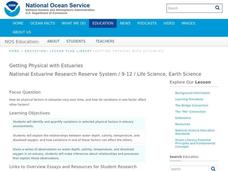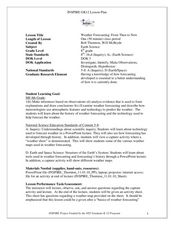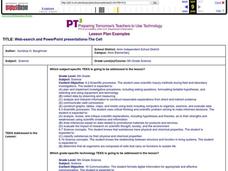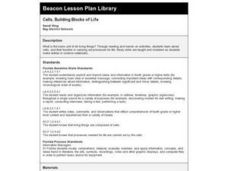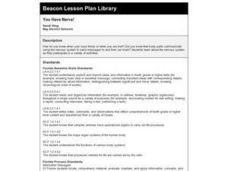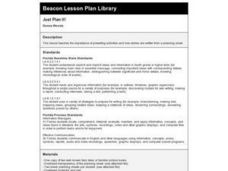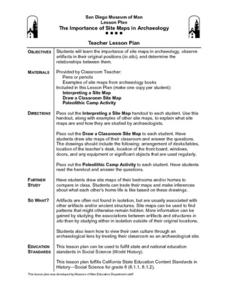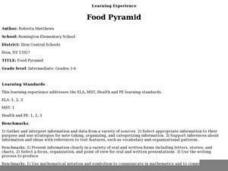Curated OER
Getting Physical with Estuaries
Students study estuaries and how the physical factors change over time. In this investigative lesson students use a website to gain knowledge of estuaries then in groups they create and present their charts.
Curated OER
Force: Push and Pull
In this force instructional activity, students answer short answer questions about pushing and pulling different objects. Students complete 15 questions.
Curated OER
Weather Forecasting: From Then to Now
Eighth graders review the history of weather forecasting. For this earth science lesson, 8th graders identify the different tools used in forecasting weather. They explain why it's important to know the weather.
Curated OER
The Battle of Stones River: The Soldiers' Story
Learners organize items in a "doohickey kit" distributed by the teachers, creating categories using classification schemes. In this classification lesson, students compare systems within groups and write questions that could be answered...
Curated OER
Web-search And PowerPoint Presentations-The Cell
Sixth graders create a PowerPoint presentation using information that they have compiled from their web search and rubric web sites, text and other applicable references. They work in pairs to complete these searches and projects.
Curated OER
Ancient Cultures
Students develop archeological skills in order to explain how scientists determine what ancient cultures were like. They develop an appreciation of the work that is involved in finding out about our past.
Curated OER
Epidemiology: Graphing and Analyzing Health Data
Students graph data on fetal and infant mortality rates collected by the Centers for Disease Control and Prevention. They identify trends in the data and propose potential causes for the trends.
Curated OER
The Human Body Systems - Lesson Plan
Students identify the following organ systems in the human body and state their functions: muscular, skeletal, circulatory, respiratory, digestive.
Curated OER
The Brain and the Sense Organs - Lesson Plan
Students identify the five sense organs and state the uses of the five senses.
Curated OER
Extreme Acceleration
Students explore the concept of acceleration. They determine the acceleration rate of a roller-blader and graph the results.
Curated OER
Cells, Building Blocks of Life
Fourth graders, in groups, explore cells, the basic unit of all living things.
Curated OER
Cells in the Making
Students examine and research the parts of a cell, their functions, and life processes. They simulate how cells receive nutrients using coffee filters, water, and coffee, and construct cells using pudding, cookie dough, and candy.
Curated OER
The Making of an Organ
Students examine and research how cells make up our organs. They create a model of a tongue showing cells, tissues and the organ.
Curated OER
I Need Air
Students examine and research the organs of the respiratory system. They participate in a vocabulary card matching game, create a graphic organizer, and participate in an experiment titled, Floating on Air.
Curated OER
The Skeleton Within
Fourth graders explore the bones, joints, and other attributes of the skeletal system.
Curated OER
What a Waste!
Fourth graders explore the kidney, bladder, and function of the excretory (urinary) system.
Curated OER
You Have Nerve!
Fourth graders investigate the nervous system and how it communicates messages to and from the brain.
Curated OER
Systems Working Together
Fourth graders practice reading in the content areas (science) in order to explore the interdependence of the body systems. They answer written questions after reading.
Curated OER
Just Plan It!
Fourth graders practice using a planning sheet for a well-known fairy tale or picture book.
Curated OER
The Myth and the Reality: Pioneering in the Midwest
Students examine the myth and reality of settlement in the Upper Midwest during the late 19th and early 20th centuries.
Curated OER
Learning From Leaves: Adaptations To Differing Light Levels
Students, in groups, examine plants with different light levels. They are given plants from a tropical and desert region. They write a hypothesis at the beginning of the experiment.
Curated OER
The Importance of Site Maps in Archaeology
Students consider the importance of site maps in archeology. They interpret site maps, draw site maps of their classroom and home and then participate in simulated Paleolithic archeological camp activity.
Curated OER
Food Pyramid - Daily Diet Diary
Learners keep a daily diet diary and discuss the Food Pyramid. They investigate other geometric shapes as a way to display daily food guidelines. In groups, they design a menu for the Food Pyramid Restaurant.
Other popular searches
- Inference and Observation
- Observation Inference Lab
- Observation Inference Demo
- Inference Observation
- Observation Inference Science


